publication-type: Article/Paper
-
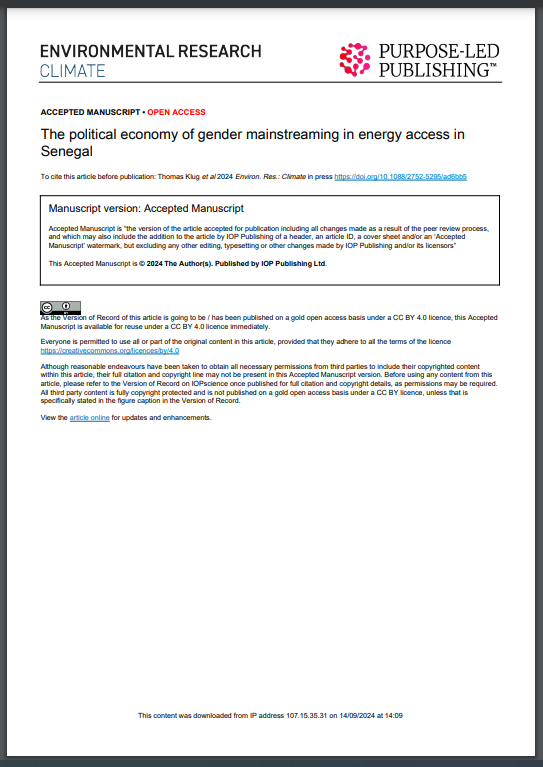
The political economy of gender mainstreaming in energy access in Senegal
Accepted manuscript In June 2017, the Economic Community of West African States (ECOWAS) adopted the Policy for Gender Mainstreaming in Energy Access to integrate gender equity in West Africa’s energy and climate policy making. The policy represents the first regional gender and energy policy in the world, establishing a framework to enhance understanding at the…
-
Women’s work is never done: Lifting the gendered burden of firewood collection and household energy use in Kenya
In rural Kenya, firewood is used for cooking and heating by 9 out of every 10 households due to its affordability, availability and convenience. This study was carried out using social and natural science methods to understand women’s energy burdens and the reasons for the persistent use of firewood. Firewood remains the main source of…
-
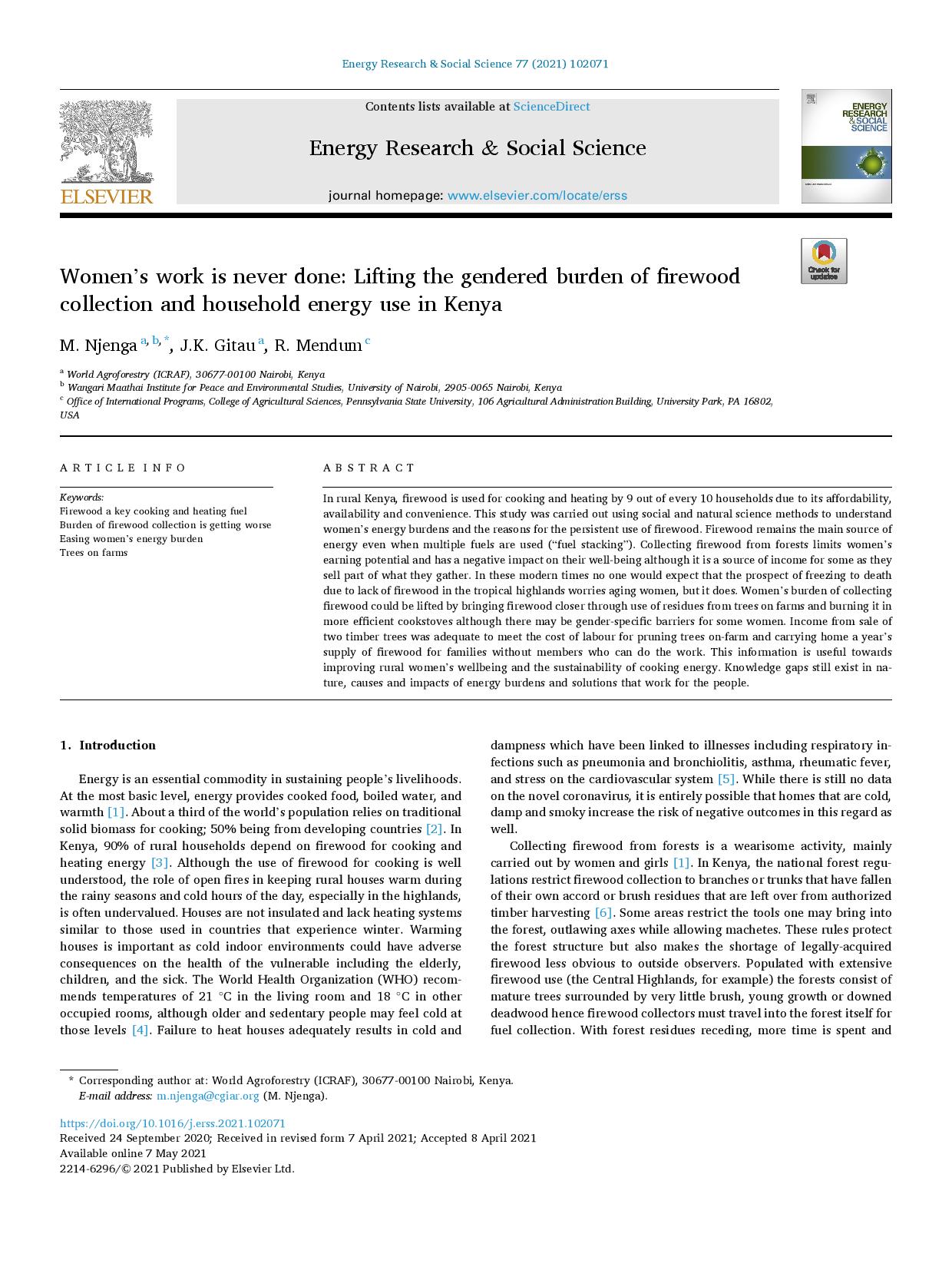
Women’s work is never done: Lifting the gendered burden of firewood collection and household energy use in Kenya
In rural Kenya, firewood is used for cooking and heating by 9 out of every 10 households due to its affordability, availability and convenience. This study was carried out using social and natural science methods to understand women’s energy burdens and the reasons for the persistent use of firewood. Firewood remains the main source of…
-
Enabling Equitable Access to Rural Electrification: Current thinking on energy, poverty and gender
This briefing paper summarizes current thinking on energy, poverty and gender. A particular focus is given on rural electrification with renewable energy, based on ASTAE’s comparative advantage historically. A companion report on major institutional actors and their activities has also been prepared.
-
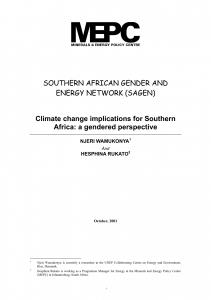
Climate Change Implications for Southern Africa: A gendered perspective
This paper explores some of the potential impacts of climate change, possible adaptation strategies, and whether or not, given the socio-economic and political situation of the region, progress can be made towards ensuring that the region survives climate change. The paper highlights critical issues in international policies and strategies and their implications for the Southern…
-
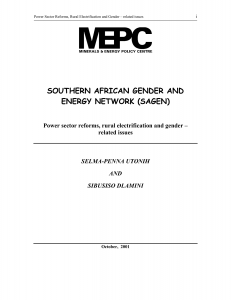
Power Sector Reforms, Rural Electrification and Gender-Related Issues
The principle objectives of this background paper, as outlined in the terms of reference, are to provide an overview of existing approaches and projects in areas of gender and energy, including where possible, practical experiences with gender and energy policy formulation and implementation. The paper is written with a view to deepen our analysis of…
-
Gender Perspectives on Energy for CSD-9
This paper sets out the reasons, both from a Southern and from a Northern perspective, why gender issues need to be more strongly integrated into energy policies, planning and projects, to increase sustainable energy access for women. It refers to relevant recommendations made at UN meetings and other expert gatherings and lists a number of…
-
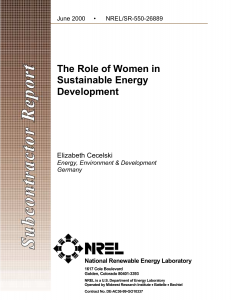
The Role of Women in Sustainable Energy Development
This paper, originally prepared to address the concerns of renewable energy technical experts at the World Renewable Energy Congress, reviews the literature on women’s involvement in renewable energy and presents some examples of the results of including or excluding women in renewable energy development. It addresses four questions: Why do women need renewable energy? Are…
-
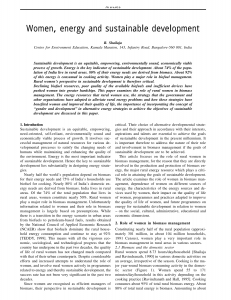
Women, Energy and Sustainable Development
Sustainable development is an equitable, empowering, environmentally sound, economically viable process of growth. Energy is the key indicator of sustainable development. About 74% of the population of India live in rural areas. 80% of their energy needs are derived from biomass. About 92% of this energy is consumed in cooking activity. Women play a major…
-
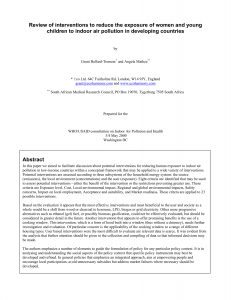
Review of Interventions to Reduce the Exposure of Women and Young Children to Indoor Air Pollution in Developing Countries
The aim of this paper is to facilitate discussion about potential interventions for reducing human exposure to indoor air pollution in low-income countries (LIC) within a conceptual framework that may be applied to a wide variety of interventions. This main goal may be divided into the following sub goals: To establish a conceptual framework for…
-
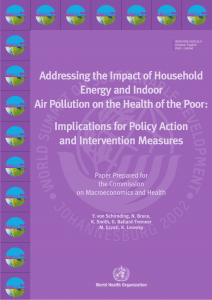
Addressing the Impact of Household Energy and Indoor Air Pollution on the Health of the Poor: Implications for policy action and intervention measures
Use of biomass fuels and coal burning indoors leads to levels of indoor air pollution many times higher than international ambient air quality standards allow for, exposing poor women and children on a daily basis to a major public health hazard. This exposure increases the risk of important diseases, and is estimated to account for…

